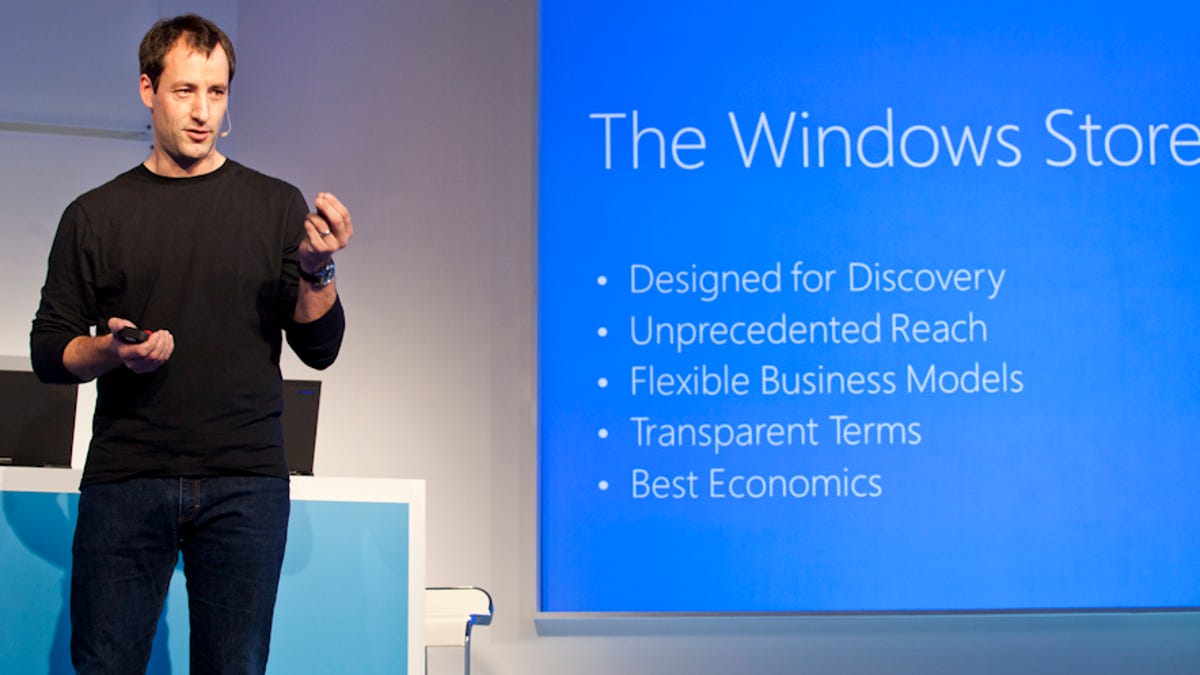Microsoft works to lure devs by taking less for app sales
The software giant, aiming to undercut rivals' online marketplace pricing, will take 30 percent of sales until an app hits $25,000 in revenue, then 20 percent after that.

SAN FRANCISCO--In a bid to lure developers to its upcoming application store for Windows, Microsoft revealed a new pricing scheme designed to undercut rivals' marketplaces.
Microsoft will take 30 percent of application sales revenue from programs sold in the Windows Store, an app marketplace that will be build into Windows 8, similar to what rivals such as Apple take from app sales in their stores. But Microsoft will take only 20 percent once an app makes more than $25,000.
"We're going to give you a bigger bite of the apple," said Antoine Leblond, a corporate vice president of Windows Web Services.
Microsoft set the price point for apps in the store at $1.49 to $999.99.
The store will open when Microsoft launches the beta of Windows 8 in late February 2012. App submissions for the beta will be by invitation only.
Microsoft will also give developers tools to create a variety of pricing models, offering consumers free versions, as well as paid ones. They can even create versions of an app that end after specific periods of time. And newspapers, for example, can sell subscriptions from inside their app, something, Leblond said, couldn't be created on iTunes. What's more, developers can use Microsoft's tools or their own subscription and payment mechanisms.
The event was something of a coming out for the Windows Store. Microsoft first discussed the online marketplace at its Build developer conference in Anaheim in September. The idea is to give customers the ability to buy applications from their PCs or tablets, instead of having to find packaged software or download apps from various software makers' sites.
The Windows Store has a clean interface, with a white background and the increasingly familiar so-called Metro-style rectangular tile interface. In the Windows Store, users tap on the tiles to learn about, demo and buy the apps. The store offer users the ability to try out apps, such as games, testing them out before buying.
"Trials work really, really well for paid apps," Leblond said.
The marketplace will offer a host of categories, including "Books & reference," "Entertainment," and "Games." And the store will offer up personalized recommendations based on previous purchases.
The Windows Store follows the path of Apple's Mac App Store, a software marketplace that's built into Mac OS X. That's provided a way for customers to quickly download both free and paid applications for their computers.
Microsoft is already running application stores for both the Xbox and Windows Phone devices. But the potential market for an app store within Windows could be enormous. IDC estimates that 433.5 million PCs will ship in 2013, the first full year that Windows 8 will be in the market. Clearly, a huge chunk of those will run the new operating system, and have access to the new Windows Store.
Leblond compared Windows to the Android phones and tablets, as well as iPhones and iPads to Windows 7, which has moved 500 million copies since it debuted two years ago. There are 247 million devices running Google's Android in the market, and 152 million gadgets running Apple's iOS, Leblond said.
"It's incredible, incredible reach, and that's what you get to participate in by developing Metro-style Windows apps," Leblond said.
Microsoft will also offer the app marketplace around the world. Leblond said it will support more than 100 languages in 231 different markets.
The store isn't just about making it easy to discover Windows apps; it's also about creating a new revenue stream for Microsoft. Microsoft will likely take a piece of every sale it generates through the store. With the dominant operating system software as a lure, the Windows Store could evolve into a meaningful revenue generator for the company, which rang up just shy of $70 billion in the last fiscal year.
The event was held toward the end of the day to accommodate developers' schedules. And they outnumbered journalists at the hip Laurent Studio in San Francisco's Mission District where the event was held.

